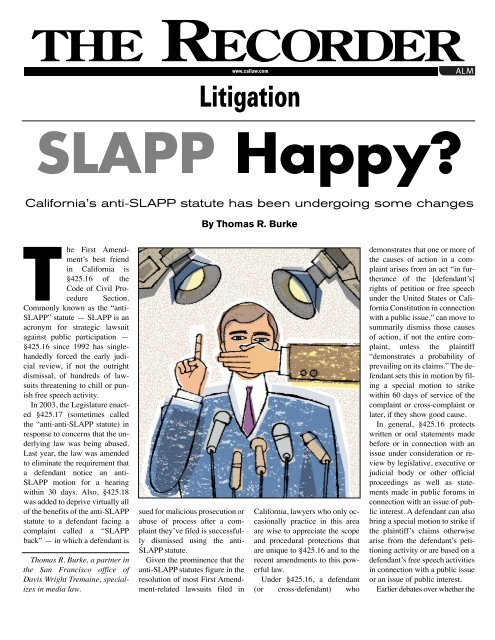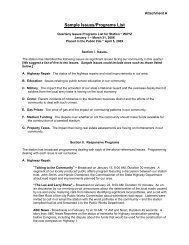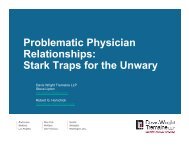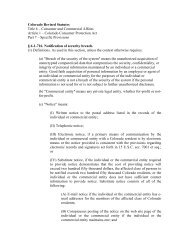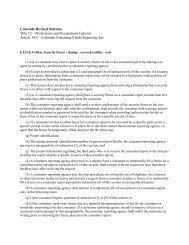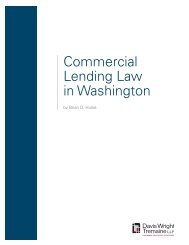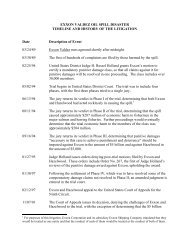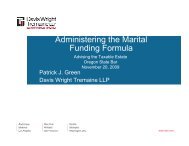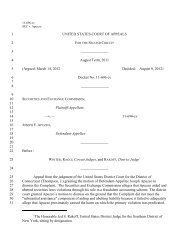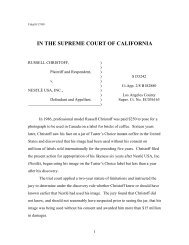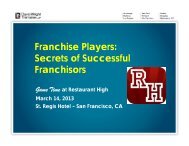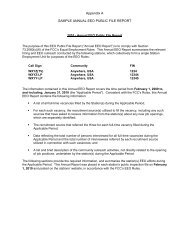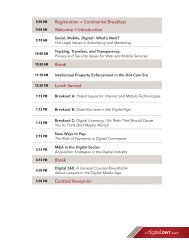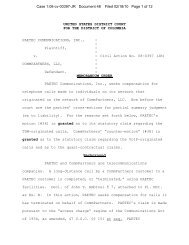"SLAPP Happy? California's anti-SLAPP statute has been ...
"SLAPP Happy? California's anti-SLAPP statute has been ...
"SLAPP Happy? California's anti-SLAPP statute has been ...
Create successful ePaper yourself
Turn your PDF publications into a flip-book with our unique Google optimized e-Paper software.
www.callaw.comLitigation<strong>SLAPP</strong> <strong>Happy</strong>?California’s <strong>anti</strong>-<strong>SLAPP</strong> <strong>statute</strong> <strong>has</strong> <strong>been</strong> undergoing some changesBy Thomas R. BurkeThe First Amendment’sbest friendin California is§425.16 of theCode of Civil ProcedureSection.Commonly known as the “<strong>anti</strong>-<strong>SLAPP</strong>” <strong>statute</strong> — <strong>SLAPP</strong> is anacronym for strategic lawsuitagainst public participation —§425.16 since 1992 <strong>has</strong> singlehandedlyforced the early judicialreview, if not the outrightdismissal, of hundreds of lawsuitsthreatening to chill or punishfree speech activity.In 2003, the Legislature enacted§425.17 (sometimes calledthe “<strong>anti</strong>-<strong>anti</strong>-<strong>SLAPP</strong> <strong>statute</strong>) inresponse to concerns that the underlyinglaw was being abused.Last year, the law was amendedto eliminate the requirement thata defendant notice an <strong>anti</strong>-<strong>SLAPP</strong> motion for a hearingwithin 30 days. Also, §425.18was added to deprive virtually allof the benefits of the <strong>anti</strong>-<strong>SLAPP</strong><strong>statute</strong> to a defendant facing acomplaint called a “<strong>SLAPP</strong>back” — in which a defendant isThomas R. Burke, a partner inthe San Francisco office ofDavis Wright Tremaine, specializesin media law.sued for malicious prosecution orabuse of process after a complaintthey’ve filed is successfullydismissed using the <strong>anti</strong>-<strong>SLAPP</strong> <strong>statute</strong>.Given the prominence that the<strong>anti</strong>-<strong>SLAPP</strong> <strong>statute</strong>s figure in theresolution of most First Amendment-relatedlawsuits filed inCalifornia, lawyers who only occasionallypractice in this areaare wise to appreciate the scopeand procedural protections thatare unique to §425.16 and to therecent amendments to this powerfullaw.Under §425.16, a defendant(or cross-defendant) whodemonstrates that one or more ofthe causes of action in a complaintarises from an act “in furtheranceof the [defendant’s]rights of petition or free speechunder the United States or CaliforniaConstitution in connectionwith a public issue,” can move tosummarily dismiss those causesof action, if not the entire complaint,unless the plaintiff“demonstrates a probability ofprevailing on its claims.” The defendantsets this in motion by filinga special motion to strikewithin 60 days of service of thecomplaint or cross-complaint orlater, if they show good cause.In general, §425.16 protectswritten or oral statements madebefore or in connection with anissue under consideration or reviewby legislative, executive orjudicial body or other officialproceedings as well as statementsmade in public forums inconnection with an issue of publicinterest. A defendant can alsobring a special motion to strike ifthe plaintiff’s claims otherwisearise from the defendant’s petitioningactivity or are based on adefendant’s free speech activitiesin connection with a public issueor an issue of public interest.Earlier debates over whether the
asic <strong>anti</strong>-<strong>SLAPP</strong> <strong>statute</strong> was to be narrowlyor broadly construed were resolvedby a trio of California Supreme Court decisionsthat held in favor of a broad construction.Those rulings can be found atBriggs v. Eden Council for Hope & Opportunity,19 Cal.4th 1106 (1999);Ketchum v. Moses, 24 Cal.4th 1122(2001); and Equilon Enterprises LLC v.Consumer Cause, 29 Cal.4th 53 (2002).Defendants may rely upon §425.16without proving that plaintiffs intendedto chill their free speech or petitioningrights even if defendants allegedly actedwrongfully. Indeed, the broad constitutionalprotection provided by §425.16 isfound in its simple application — the<strong>statute</strong> applies to all causes of action —including garden variety breach of contractand fraud claims.That’s because, underNavellier v. Sletten,29 Cal.4th 82 (2002),the sole initial focus iswhether the defendant’sactivity involvedspeech or petitioningactivity protectedby the <strong>statute</strong>.If a defendant satisfiesthe initial threshold,in the secondprong the burden shifts to the plaintiff toestablish a “probability” of prevailing oneach cause of action. At this stage theplaintiff cannot simply rely on the allegationsincluded in the complaint. Instead,the plaintiff must present admissibleevidence in support of the probabilityof prevailing on each claim. If theplaintiff fails to satisfy this evidentiaryburden, the court must strike each causeof action. Significantly, the recovery ofattorneys’ fees and costs is mandatory.Even if a special motion to strike is notimmediately granted, §425.16 providesdefendants with other immediate tangiblebenefits. Once a defendant files aspecial motion to strike, all discovery inthe action is stayed, absent permissionfrom the trial court. Further, the defendant<strong>has</strong> the right to automatically appeala trial court’s denial of a special motionto strike. Lastly, even if the trialcourt denies the motion after decidingthat the plaintiff <strong>has</strong> established a probabilityof prevailing, this determination isnot admissible for other purposes in thecase or in any subsequent proceeding.In response to what some legislatorsviewed as abuses of the <strong>anti</strong>-<strong>SLAPP</strong><strong>statute</strong>, §425.17, which went into effecton Jan. 1, 2004, exempts certain conductfrom protections of the underlying<strong>statute</strong>. The result is a cobbling of twodistinctly different categories of complaints:lawsuits brought “solely in thepublic interest” and lawsuits targetingcertain commercial speech. Althoughonly a few published decisions have analyzedeither subdivision, the rulingshave interpreted §425.17 to be consistentwith the Legislature’s goal of curbingabuses of the law. At the same time,however, courts have declared that theThe Legislature curtailedthe <strong>anti</strong>-<strong>SLAPP</strong> <strong>statute</strong> inresponse to allegations ofabuse of the underlyinglaw.<strong>anti</strong>-<strong>SLAPP</strong> <strong>statute</strong> remains available tothose facing threats to First Amendmentactivities.While part B of §425.17 exempts certain“public interest” lawsuits from beingquickly dismissed with an <strong>anti</strong>-<strong>SLAPP</strong> motion, that can happen only ifthree conditions are satisfied. First, theplaintiff must not seek any relief greaterthan or different from the relief soughtfor the public or a class of which theplaintiff is a member. Second, the plaintiff’slawsuit must enforce an “importantright affecting the public interest” andconfer a significant benefit on the generalpublic or a large class of persons.Third, private enforcement must be necessary,with a disproportionate financialburden placed on the plaintiff in relationto its stake in the matter.In Ingles v. Westwood One BroadcastingServices, 129 Cal.App.4th 1050(2005), the court of appeal noted that§425.17(b) applies to a limited categoryof lawsuits brought “solely” in the publicinterest or on behalf of the generalpublic. In Ingles, the court determinedthat even though the plaintiff brought acause of action under California’s UnruhAct for age discrimination, the complaintdid not satisfy the requirements of§425.17(b) because the plaintiff soughtmonetary damages for himself. Thecourt also found that the plaintiff’s causeof action for violation of Business &Professions Code §17200 did not meetthe requirement of 425.17(b)(2) becausethe injunctive relief sought was also personalto the plaintiff.Similarly, in Blanchard v. DirecTV,123 Cal.App.4th 903 (2004), the court ofappeal determined that while both pecuniaryand nonpecuniaryrelief can beconsidered when decidingwhether theplaintiff is seekingpersonal gain or publicbenefit under§425.17(b)(2), the“relevant inquiry iswhether the cost ofthe plaintiff’s legalvictory transcendstheir personal interest.”In Blanchard, the appellate courtfound that the plaintiff’s lawsuit challengingdemand letters sent by customersof a satellite television companywould not enforce an important right affectingthe public interest and thereforewas not exempt from the bar of §425.17.Section 425.17(c) forbids reliance onthe <strong>anti</strong>-<strong>SLAPP</strong> <strong>statute</strong> against causes ofaction brought against those who are“primarily engaged in the business ofselling or leasing goods or services, including,but not limited to, insurance, securities,or financial instruments ...” Forthis exemption to apply, two conditionsmust be satisfied. First, the challengedstatements must be representations offact about the defendant’s or the defendant’scompetitor’s business operations,goods or services made for the purposeof obtaining approval for, promoting, securingsales or leases or commercialtransactions in the person’s goods orservices or if the statement or conduct
was made in the course of delivering theperson’s goods or services. Second, theintended audience receiving the statementmust include an actual or potentialcustomer or a person likely to repeat thestatement to a customer or involve situationswhere the statement arises out of aregulatory approval process. Becausethere are obviously many undefinedterms and elements involved in§425.17(c), future court decisions arelikely to further define its contours.To date, the constitutionality of§425.17(c) <strong>has</strong> <strong>been</strong> upheld against assertionsthat it unduly restricts commercialspeech (Brenton v. Metabolife Int’l,116 Cal.App.4th 679 (2004)) and violatesequal protection guarantees (Metcalfv. U-Haul Int’l, 118 Cal.App.4th1261, (2004)).Meanwhile, two published federalcourt decisions restrict §425.17(c) tosituations in which a defendant makes afactual representation about his owngoods and services or about a competitor’sgoods and services. In New.net v.Lavasoft, 356 F.Supp.2d 1090 (C.D.Cal. 2004), a software company wassued after including information aboutthe plaintiff’s product in its <strong>anti</strong>-spywaredatabase. In analyzing §425.17(c),the court first questioned whether thedefendant was engaged in the businessof selling goods and, after observingthat the parties were not competitors,determined that the exemption to the<strong>anti</strong>-<strong>SLAPP</strong> <strong>statute</strong> did not apply.Similarly, the use of §425.17(c) was rejectedin Troy Group v. Tilson, 364 F.Supp.2d 1149 (C.D. Cal. 2005), a libellawsuit arising from allegedly defamatorycomments about the defendant companythat were published in an email message.The court observed that the e-mail was notabout Tilson’s business but instead wasabout Troy, a non-competitor. The samebusiness-competitor analysis was also followedin Brill Media v. TCW Group, 132Cal.App.4th 324 (2005).Separate and independent of§425.17’s public interest litigation andcommercial speech exemptions is subdivision(d), which expressly exemptsjournalists from the scope of §425.17due to their protection under California’sshield law. Subdivision (d)(1) also exemptsothers engaged in the gatheringand dissemination of ideas to the public.Lastly, subdivision (d)(2) exempts lawsuitsthat are based on any “dramatic, literary,musical, political or artisticworks.” In Major v. Silna, 134Cal.App.4th 1485 (2005), the court ofappeal found that the defendant’s election-relatedletter and advertisementwere “not different in kind” from the illustrativeexamples identified in subdivision(d)(2), leaving the <strong>anti</strong>-<strong>SLAPP</strong><strong>statute</strong> available to the defendant.In 2005, the Legislature removedfrom §425.16(f) the requirement that themoving party schedule a special motionto strike for a hearing within 30 days afterservice of the motion. The responsibilityfor scheduling is now left with theclerk of the court.This amendment expressly overturneda pair of court rulings — Decker v. U.D.Registry, 105 Cal.App.4th 1382, andFair Political Practices Commission v.American Civil Rights Coalition, 121Cal.App.4th 1171, (2004) — that saidthe previous 30-day notice requirementwas jurisdictional.Finally, the Legislature late last yearclosed another emerging loophole — theuse of the <strong>anti</strong>-<strong>SLAPP</strong> <strong>statute</strong> by a defendantfacing a malicious prosecutionor abuse of process lawsuit by someonewho successfully prevailed against themearlier. By enacting §425.18, the Legislaturebarred a defendant in these socalled“<strong>SLAPP</strong> back” situations frombenefiting from the protections otherwiseavailable under §425.16. Althoughno published decisions have yet to analyze§425.18, by its plain language, althougha defendant in a <strong>SLAPP</strong> backlawsuit may still use the <strong>anti</strong>-<strong>SLAPP</strong><strong>statute</strong>, there is no right to recover attorneys’fees, stay discovery or immediatelyappeal the trial court’s ruling.After more than a decade on thebooks, §425.16 remains the workhorsewhen it comes to First Amendment litigationin California. Because of this law,trial courts now routinely analyze the legitimacyof complaints implicating freespeech and petitioning activities. Nine<strong>SLAPP</strong>-related matters are currentlyawaiting action by the CaliforniaSupreme Court. And while the recentlegislative amendments to the <strong>anti</strong>-<strong>SLAPP</strong> <strong>statute</strong> will certainly shape thecontours of the law, they are unlikely tocurtail the <strong>statute</strong>’s protection of mostFirst Amendment activities. ❖Thomas R. Burke, a partner in the San Francisco office of Davis Wright Tremaine LLP, <strong>has</strong> more than 16 years of litigationexperience focusing on media-related matters including the defense of defamation, invasion of privacy, reporter’ssubpoena issues and internet-related intellectual property litigation. Mr. Burke is currently representing clients in two <strong>anti</strong>-<strong>SLAPP</strong> lawsuits in the California Supreme Court, Taus v. Loftus (S133805) and Club Members for an Honest Election v.Sierra Club (S143087). Mr. Burke can be reached at (415) 276-6500 or via e-mail at thomasburke@dwt.com.Reprinted with permission from the special supplement issue of The Recorder Litigation. © 2006 NLP IP Company.All rights reserved. Further duplication is prohibited. For more information, contact Paula Ryplewski at (415) 749-5410.


